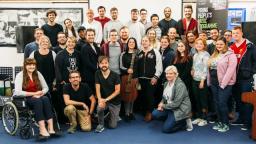
Tomas, a 21-year-old drummer from Cambridge, was diagnosed with cancer in his first year at university. Making music with support from CLIC Sargent and Youth Music has helped him recover emotionally.
Tomas took part in a week-long residential music-making workshop as part of the programme run by CLIC Sargent with funding from Youth Music.
Getting diagnosed
“I played drums in school, and started taking it more seriously aged 16. I realised I wanted to study music. After A-levels I went to BIMM in London to do a three-year music course.
“Towards the end of my first year, I was diagnosed with Hodgkin’s lymphoma. I had to drop out and put everything on hold.”
Tomas had known something was wrong for several months, but it took a while to get the correct diagnosis, which made things even harder.
“For a while [before being diagnosed] I was distancing myself from uni, friends, even playing music. I love playing music, it’s my stress relief, but I couldn’t even enjoy that because I was so concerned and wasn’t sure what was going on.
“Being diagnosed is such a huge thing that I didn’t really ever deal with emotionally. I was in shock for about five minutes. And then you’re rushed into treatment.”
Music and the road to recovery
“I had five months of treatment, which went really well. But it took a while for me to get back into playing. You get a bit nervous, you think ‘can I still do it?’ I was in such a weak state after all the treatment.
“Music helped a lot with my recovery. I had the opportunity to see The Who at the Royal Albert Hall. That was an important moment. Seeing a live performance of such a high standard really inspired me to get back into music.
“I sat down in front of the kit and started playing a few things, getting a feel for it again, jamming out to bands I liked.
“Then I found out about this music programme. One of the CLIC Sargent social workers knew I was into music and put me in touch with Phil [the programme co-ordinator].”
Overcoming anxiety
“I was really struggling. I used to be an anxious person anyway, but as soon as all the cancer stuff came, it got really out of hand. It was controlling me, and it was hindering me from doing nigh on anything.
“You get so used to being on your own. Pulling out of uni, you’re isolated, you can’t be with your friends – all their lives are moving on and yours is standing still.
“I’ve been looking forward to [the residential workshop] so much. Coming here, meeting other people, and they’re all in the same boat as you – there’s no pressure to put on a face, you can be yourself and no one judges you, and vice versa. It’s a very rare thing to find.”
You can leave the health thing at the door, but on the other hand you find yourself joking about things other people can’t joke about!
A new start
“I’m starting back at uni this year. I’m even more excited than I was first time round because of all these things that have inspired me. I’ve got lots of things to look forward to.
“Career-wise, I’d love to make it doing my own music. I play anything from jazz to prog rock and metal. This week has helped quite a lot with songwriting.
“One of my big aims is to take my experience and eventually make it into a concept album – the whole experience, all the emotions, compile it into one half-hour piece that flows all the way through.”
I’ve got lots of things that I need to get off my chest and I think music is a really good way to do it.

Youth Music and Clic Sargent
Read more about the three-year national project we’re currently funding for young musicians aged 16-24 who’ve had a cancer diagnosis.
